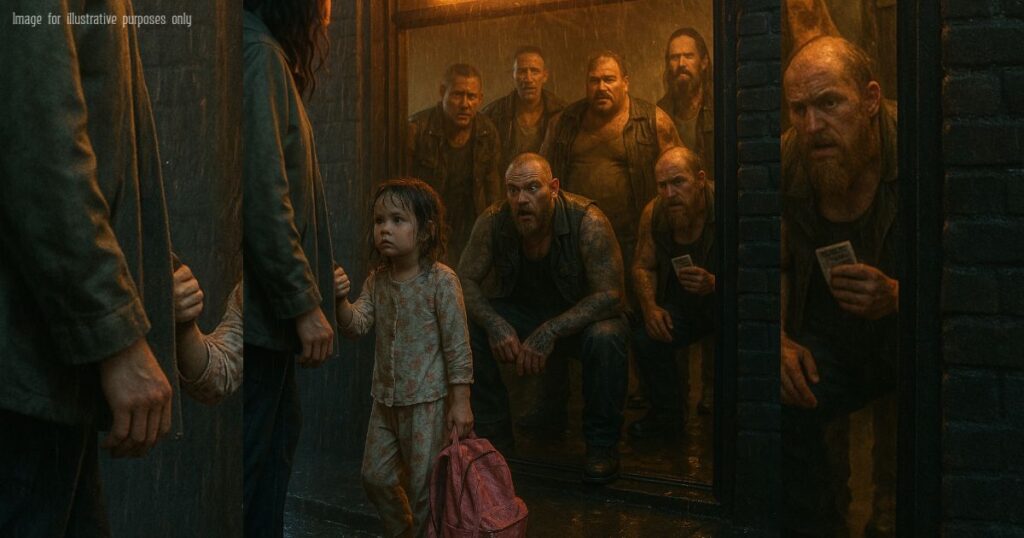She came in with the rain, a seven-year-old girl with a pink backpack dragging behind her. One hand was clamped to her mother’s sleeve. “Mom said find the people who make engines safe,” she whispered.
I was wiping down a counter in a roadside place where the coffee tastes like burned courage. My name is Ray Navarro, though people call me Chaplain. I used to be a medic, but now I fix engines because they complain less than hearts.
The girl, Mila, stood in the doorway while water pooled around her sneakers. Her pajama knees were dirty, and the sleeve she clutched was a dull, worrying color.
“Help,” she said, her voice quiet. It was like she was trying to preserve the last good part of the night.
Hawk, an ex-cop, was already on his feet. Moose, a mechanic built like a walk-in fridge, moved to block the wind. Silas, six months out of prison and on a curfew, hovered at the edge, worried about the price of stepping forward.
“Call it in,” Hawk said to me. I dialed, letting habit beat panic.
When I knelt, Mila looked past me to the bikes sleeping under the rain. “You’re the engine people, right? Mom said engines mean safe.”
“She’s right,” I told her, keeping my voice steady. “What’s your name?”
“Mila. Mom’s name is Elena.”
Elena made a small sound, her breath catching on the edge of consciousness as she tried to speak. Hawk leaned in but didn’t touch her. “Hold,” he breathed. “We keep the scene clean. We help without spoiling the truth.”
A safety pin on Mila’s pajama top held a folded note. Using a napkin, Hawk lifted it and read aloud. “If I can’t speak, this is my daughter. Please keep her safe.”
The note continued, “If anyone asks, show Detective Whitaker. Phone code is 0731. There’s a key in the pink backpack.”
“Copy that,” I said. “Mila, can you let go of Mom’s sleeve, just for the paramedics to look?”
She swallowed. “She told me not to let go until I heard an engine.”
Right then, the ambulance pulled in, its engine idling. Mila opened her hand.
The ER was short-staffed because of the night shift, budget cuts, and a storm. They moved Elena to surgery with words that promised effort but not outcomes.
In the waiting area, I watched headlights smear across the wet pavement and counted my breaths, an old habit from my time as a medic overseas.
Detective June Whitaker found us near the vending machines. She carried too many stories behind her eyes. We had met once before while fundraising for a shelter.
“I heard the call,” she said quietly. “Tell me what you saw.”
Hawk laid out the facts like a formal report. Silas kept glancing at the doors, checking the time against his curfew.
“Before we go further,” Whitaker said, turning to Mila, “is there anyone you want me to call?”
Mila shook her head hard, rattling the pink scrunchie in her hair. “He can’t know.”
“Who’s he?” I asked softly.
Mila mouthed the word before she could say it. When she finally spoke, the air seemed to contract. “Cole.”
Whitaker’s jaw tightened. “Cole Harlan?”
Mila nodded.
I don’t follow headlines, but even I knew the name. He was a polished candidate for district attorney, all smiles and handshakes. When a public face is that bright, the shadows hide well.
“Phone,” Hawk said, and I handed him Elena’s. The screen was cracked but alive.
The code, 0731, opened messages that felt heavy. There were short recordings, old-style printed photos that are harder to fake, and a scheduled email. The email was set to go out at dawn to a small, stubborn newsroom.
“Chain of custody,” Hawk murmured. “We document possession, we don’t edit, we don’t forward. Detective?”
Whitaker nodded and began logging the time, device, and contents. The right way isn’t quick, but it keeps the truth safe.
During a quiet moment, I went out to the lot. I came back with a small helmet I’d bought at a rummage sale years ago.
“This is for later,” I told Mila. “It means you sit behind me and the world can’t push you off.” I added, “You’ll hear the engine under you. It sounds like a promise.”
Silas watched us like a man deciding which bridge to burn. “If he shows up,” he said, “I’m staying.”
“You’ve got a curfew,” Hawk reminded him.
Silas shook his head. “Some lines matter more than others.”
The sliding doors opened and Cole Harlan stepped in with a perfectly dry umbrella. He moved like the halls were designed for him, ignoring me, Hawk, and Silas. He bent toward Mila with a public smile that didn’t reach his eyes.
“Sweetheart,” he said, the word not belonging to him. “Let’s get you home.”
Mila’s reaction was quiet and total. She folded into herself and pressed against my side. “Please,” she breathed. “No.”


